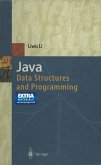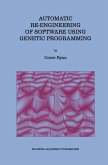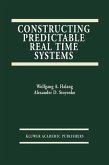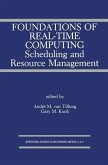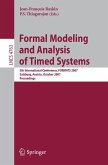73,95 €
73,95 €
inkl. MwSt.
Sofort per Download lieferbar

37 °P sammeln
73,95 €
Als Download kaufen

73,95 €
inkl. MwSt.
Sofort per Download lieferbar

37 °P sammeln
Jetzt verschenken
Alle Infos zum eBook verschenken
73,95 €
inkl. MwSt.
Sofort per Download lieferbar
Alle Infos zum eBook verschenken

37 °P sammeln
- Format: PDF
- Merkliste
- Auf die Merkliste
- Bewerten Bewerten
- Teilen
- Produkt teilen
- Produkterinnerung
- Produkterinnerung

Bitte loggen Sie sich zunächst in Ihr Kundenkonto ein oder registrieren Sie sich bei
bücher.de, um das eBook-Abo tolino select nutzen zu können.
Hier können Sie sich einloggen
Hier können Sie sich einloggen
Sie sind bereits eingeloggt. Klicken Sie auf 2. tolino select Abo, um fortzufahren.

Bitte loggen Sie sich zunächst in Ihr Kundenkonto ein oder registrieren Sie sich bei bücher.de, um das eBook-Abo tolino select nutzen zu können.
A comprehensive introduction and guide to the STL, pitched at the level of readers already familiar with C++. It presents a thorough overview of the capabilities of the STL, detailed discussions of the use of containers, descriptions of the algorithms and how they may be used, and how the STL may be extended. An appendix provides an alphabetical reference to the entire STL, making this an extremely useful hands-on text for programmers of C++ and students coming to the STL for the first time.
- Geräte: PC
- ohne Kopierschutz
- eBook Hilfe
- Größe: 37.71MB
Andere Kunden interessierten sich auch für
![Java: Data Structures and Programming (eBook, PDF) Java: Data Structures and Programming (eBook, PDF)]() Liwu LiJava: Data Structures and Programming (eBook, PDF)40,95 €
Liwu LiJava: Data Structures and Programming (eBook, PDF)40,95 €![Automatic Re-engineering of Software Using Genetic Programming (eBook, PDF) Automatic Re-engineering of Software Using Genetic Programming (eBook, PDF)]() Conor RyanAutomatic Re-engineering of Software Using Genetic Programming (eBook, PDF)73,95 €
Conor RyanAutomatic Re-engineering of Software Using Genetic Programming (eBook, PDF)73,95 €![Constructing Predictable Real Time Systems (eBook, PDF) Constructing Predictable Real Time Systems (eBook, PDF)]() Alexander D. StoyenkoConstructing Predictable Real Time Systems (eBook, PDF)113,95 €
Alexander D. StoyenkoConstructing Predictable Real Time Systems (eBook, PDF)113,95 €![Revised Report on the Algorithmic Language Algol 68 (eBook, PDF) Revised Report on the Algorithmic Language Algol 68 (eBook, PDF)]() Revised Report on the Algorithmic Language Algol 68 (eBook, PDF)89,95 €
Revised Report on the Algorithmic Language Algol 68 (eBook, PDF)89,95 €![C++ (eBook, PDF) C++ (eBook, PDF)]() Saumyendra SenguptaC++ (eBook, PDF)40,95 €
Saumyendra SenguptaC++ (eBook, PDF)40,95 €![Foundations of Real-Time Computing: Scheduling and Resource Management (eBook, PDF) Foundations of Real-Time Computing: Scheduling and Resource Management (eBook, PDF)]() Foundations of Real-Time Computing: Scheduling and Resource Management (eBook, PDF)113,95 €
Foundations of Real-Time Computing: Scheduling and Resource Management (eBook, PDF)113,95 €![Formal Modeling and Analysis of Timed Systems (eBook, PDF) Formal Modeling and Analysis of Timed Systems (eBook, PDF)]() Formal Modeling and Analysis of Timed Systems (eBook, PDF)40,95 €
Formal Modeling and Analysis of Timed Systems (eBook, PDF)40,95 €-
-
-
A comprehensive introduction and guide to the STL, pitched at the level of readers already familiar with C++. It presents a thorough overview of the capabilities of the STL, detailed discussions of the use of containers, descriptions of the algorithms and how they may be used, and how the STL may be extended. An appendix provides an alphabetical reference to the entire STL, making this an extremely useful hands-on text for programmers of C++ and students coming to the STL for the first time.
Dieser Download kann aus rechtlichen Gründen nur mit Rechnungsadresse in A, B, BG, CY, CZ, D, DK, EW, E, FIN, F, GR, HR, H, IRL, I, LT, L, LR, M, NL, PL, P, R, S, SLO, SK ausgeliefert werden.
Produktdetails
- Produktdetails
- Verlag: Springer New York
- Seitenzahl: 594
- Erscheinungstermin: 6. Dezember 2012
- Englisch
- ISBN-13: 9781461213123
- Artikelnr.: 44052359
- Verlag: Springer New York
- Seitenzahl: 594
- Erscheinungstermin: 6. Dezember 2012
- Englisch
- ISBN-13: 9781461213123
- Artikelnr.: 44052359
- Herstellerkennzeichnung Die Herstellerinformationen sind derzeit nicht verfügbar.
1 Introduction.- 1.1 What Is the STL?.- 1.2 History.- 1.3 STL Components.- 1.4 Generic Algorithms.- 1.5 Iterators.- 1.6 Standard Exceptions.- 1.7 Complexity.- 1.8 Thread Safety.- 1.9 Namespaces.- 1.10 Overview of This Book.- 2 Iterators.- 2.1 Introduction.- 2.2 Pointers as Iterators.- 2.3 Iterator Classes.- 2.4 Using Iterators.- 2.5 Iterator Functions.- 2.6 Iterator Tags.- 2.7 Iterator Traits.- 3 The STL Algorithms.- 3.1 Introduction.- 3.2 Operators.- 3.3 Function Objects.- 3.4 The STL Algorithms.- 4 Sequence Algorithms.- 4.1 Introduction.- 4.2 Preliminaries.- 4.3 Nonmutating Sequence Algorithms.- 4.4 Mutating Sequence Algorithms.- 5 Sorting and Related Algorithms.- 5.1 Introduction.- 5.2 Preliminaries.- 5.3 Sorting.- 5.4 Searching Algorithms.- 5.5 Set Algorithms.- 5.6 Heap Algorithms.- 5.7 Miscellaneous Algorithms.- 6 Generalized Numeric Algorithms.- 6.1 Introduction.- 6.2 Accumulation.- 6.3 Inner Product.- 6.4 Partial Sum.- 6.5 Adjacent Difference.- 6.6 Numeric Arrays.- 7 Sequence Containers.- 7.1 Introduction.- 7.2 Container Operations.- 7.3 Vectors.- 7.4 Lists.- 7.5 Deques.- 7.6 Choosing a Sequence Container.- 7.7 Strings.- 8 Associative Containers.- 8.1 Introduction.- 8.2 Associative Container Operations.- 8.3 Sets.- 8.4 Multisets.- 8.5 Maps.- 8.6 Associative Container Implementation.- 8.7 Hash Table Implementations.- 8.8 Container Selection.- 9 Adaptors.- 9.1 Introduction.- 9.2 Container Adaptors.- 9.3 The Stack.- 9.4 Queues.- 9.5 Priority Queues.- 9.6 Iterator Adaptors.- 9.7 Function Adaptors.- 10 Memory Management.- 10.1 Introduction.- 10.2 Allocators.- 10.3 Uninitialized Memory Operations.- 10.4 Temporary Buffers.- 10.5 auto_ptr.- 11 Putting the STL to Work.- 11.1 Introduction.- 11.2 A Banking Problem.- 11.3 Symbol Tables.- 12 The Story Continues.- 12.1 Introduction.- 12.2 The Future.- 12.3 Summary.- Appendix A STL Header Files.- Appendix B The STL Reference.- References.
1 Introduction.- 1.1 What Is the STL?.- 1.2 History.- 1.3 STL Components.- 1.4 Generic Algorithms.- 1.5 Iterators.- 1.6 Standard Exceptions.- 1.7 Complexity.- 1.8 Thread Safety.- 1.9 Namespaces.- 1.10 Overview of This Book.- 2 Iterators.- 2.1 Introduction.- 2.2 Pointers as Iterators.- 2.3 Iterator Classes.- 2.4 Using Iterators.- 2.5 Iterator Functions.- 2.6 Iterator Tags.- 2.7 Iterator Traits.- 3 The STL Algorithms.- 3.1 Introduction.- 3.2 Operators.- 3.3 Function Objects.- 3.4 The STL Algorithms.- 4 Sequence Algorithms.- 4.1 Introduction.- 4.2 Preliminaries.- 4.3 Nonmutating Sequence Algorithms.- 4.4 Mutating Sequence Algorithms.- 5 Sorting and Related Algorithms.- 5.1 Introduction.- 5.2 Preliminaries.- 5.3 Sorting.- 5.4 Searching Algorithms.- 5.5 Set Algorithms.- 5.6 Heap Algorithms.- 5.7 Miscellaneous Algorithms.- 6 Generalized Numeric Algorithms.- 6.1 Introduction.- 6.2 Accumulation.- 6.3 Inner Product.- 6.4 Partial Sum.- 6.5 Adjacent Difference.- 6.6 Numeric Arrays.- 7 Sequence Containers.- 7.1 Introduction.- 7.2 Container Operations.- 7.3 Vectors.- 7.4 Lists.- 7.5 Deques.- 7.6 Choosing a Sequence Container.- 7.7 Strings.- 8 Associative Containers.- 8.1 Introduction.- 8.2 Associative Container Operations.- 8.3 Sets.- 8.4 Multisets.- 8.5 Maps.- 8.6 Associative Container Implementation.- 8.7 Hash Table Implementations.- 8.8 Container Selection.- 9 Adaptors.- 9.1 Introduction.- 9.2 Container Adaptors.- 9.3 The Stack.- 9.4 Queues.- 9.5 Priority Queues.- 9.6 Iterator Adaptors.- 9.7 Function Adaptors.- 10 Memory Management.- 10.1 Introduction.- 10.2 Allocators.- 10.3 Uninitialized Memory Operations.- 10.4 Temporary Buffers.- 10.5 auto_ptr.- 11 Putting the STL to Work.- 11.1 Introduction.- 11.2 A Banking Problem.- 11.3 Symbol Tables.- 12 The Story Continues.- 12.1 Introduction.- 12.2 The Future.- 12.3 Summary.- Appendix A STL Header Files.- Appendix B The STL Reference.- References.

